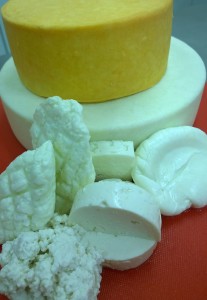Uncategorized
Talk with us about cultures at the Sandringham Cheese Festival 2022 :-)
Hi, Cheese Fans 🙂
Join us for a cheese making course at:
We will be in Harties on 14,15 May at Villa Paradiso
In Bryanston on 17,18 May at Life and Fork
In Stellenbosch on 26,27 May at the Food Science Dept.
For course info and to book, please mail Elaine on info@cheesemaking.co.za
Remember we will be at the Cheese Festival at Sandringham Farm off the N1, outside of Stellenbosch, on the last weekend of April. Come say “Hello”
Book here:
https://www.webtickets.co.za/v2/event.aspx?itemid=1510468679
To buy cheese kits and ingredients, please visit:
https://cheesemaking.co.za/shop
Support on info@cheesemaking.co.za or 084 626 4931 (Whatsapp)
Our individual cheese cultures
https://cheesemaking.co.za/shop/cheese-cultures/14-thermomeso-mix-cheese-culture-south-africa.html is a good one for most continental style cheeses that have some mesophilic and thermophilic and their blend.
https://cheesemaking.co.za/shop/cheese-cultures/80-lactobacillus-helveticus.html is our helveticus and is good for some extra flavour and proteolysis to give cheese texture more quickly.
https://cheesemaking.co.za/shop/cheese-cultures/16-thermophilic-culture.html is good for mozzarella
https://cheesemaking.co.za/shop/yoghurt-cultures/32-traditional-bulgarian-yoghurt-culture.html has some bulgaricus and thermophilus, so is a good base starter culture for harder cheeses, like pecorino and parmesan.
https://cheesemaking.co.za/shop/cheese-cultures/15-mesophilic-culture.html is a good gasforming mesophile that works for amasi too.
Please visit our online cheese making shop in South Africa and browse even more products at:
https://cheesemaking.co.za/shop
and for cheese course info, please mail Elaine on info@cheesemaking.co.za for upcoming course venues, dates and prices.
First 2018 Cheese Making Course
Join us for a cheese making course in 2018!
Regards,
Leon the Milkman
Cheese making course, Clarens FS, Feb 2017
Buy cheese making ingredients HERE
Mention in Platteland magazine :-)
Thank you for the mention of http://t.co/3FOmv4vmq7 Love Platteland! @petervannoord pic.twitter.com/n4QjkPMohz
— Leon the Milkman (@LeontheMilkman) December 9, 2014
For info and prices on cheese cultures
Please contact Elaine on 084 626 4931 or on info@cheesemaking.co.za
Sacco Cheese and Yoghurt Cultures – South Africa
Clerici-Sacco started out as Caglificio Clerici, a privately owned company manufacturing enzymes for cheese production and was originally established in 1872.
In 1984 the Italian company decided to broaden its product range and markets by purchasing Sacco and creating the Clerici-Sacco Group which is still owned by the founder’s descendants.
Thus Sacco cultures bring a long heritage of cheese production with generations of expertise to the South African Market.
An extensive list of cultures for the dairy and meat markets are available from Sacco, and specifications can be viewed on their website at www.saccosrl.it under products.
Some of the cheeses that are made from their cultures are Sweet Milk Cheeses like Gouda, Edam, Danbo – Hard Cheeses like Parmesan, Pecorino, Gruyere – Pasta Filata Types like Mozzarella, Provolone and Soft Cheeses like Camembert and Brie.
Many South African Champion cheese makers have found these real Italian Cultures to be superior in every category and have won awards with them.
What’s cheese cultures all about?
Cheese culture comes in possibly as many varieties as cheese itself. Some cultures are traditional to specific cheese types and cannot or may not be changed, but for the most part we can evaluate a specific method of cheese making and interchange cultures to make it work better in regard to getting more yield, better flavor or a faster process. More yield means that we are getting more kilograms of cheese from the same kilograms of milk. Better flavor can be imparted by more proteolytic and lipolytic cultures. This means that these specific cultures have more enzymes that can break down protein and fat to aromatic and flavor compounds that is characteristic of that cheese variety. When we use fast cultures we usually save on labour as time is money and we should elso get more cheese out, since there is less time for demineralization of the curd.
From the above you can deduct that we can play around with different cultures to optimize a process and I must state that I have never been in a factory where this is not possible and where value could not be added in some way.
When you want to buy cultures it is important to find out which cultures are traditionally used in that cheese type – then have a look at the traditional process and with your cheese making knowledge you can start to make small changes. It is important in the dairy industry or and place where you are experimenting to always change one thing at a time, otherwise you might never know which change made the critical difference.
Cultures can be divided into groups according to the temperatures they work best at like thermophiles are heat loving and operate best between 37-45°C, where mesophiles are more comfortable in room temperatures and operate best at 22-35°C.
Cultures also differ in their handling of stressors in production like heat and salt. Thermophiles are usually much more sensitive to salt, so remember that it is much better to use them when salting cheese lightly and slowly in a brine solution. If you were to use the dry salting process that is traditionally used with cheddar they will be stopped in their tracks and no more or very little lactic acid will be formed after that. So if changing to a predominant mix of thermophiles in a dry salting process you must get them much closer to your final pH, as they will stop quite fast. Mesophiles are much more tolerant of salt and will continue to acidify in the same conditions.
Cheese making cultures in South Africa are usually very traditional – it is only now that people are starting to experiment with different combinations, without changing the general characteristic of a cheese variety too much to make it unrecognizable, but enough to make it different from all the rest.
Suppliers of cheese cultures in South Africa, and surely the rest of the world are picking up on these changing needs and are innovating new mixes to accommodate the cheese makers.
Dairy culture companies are thus becoming part of a rapidly changing dairy industry.
Article from www.LeontheMilkman.com
